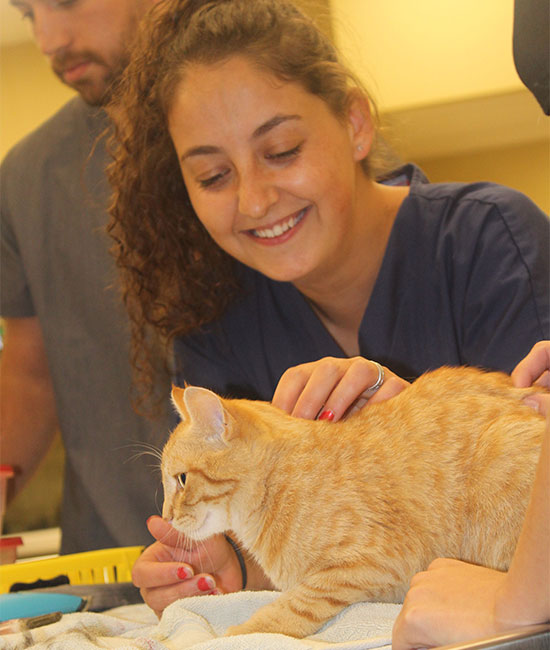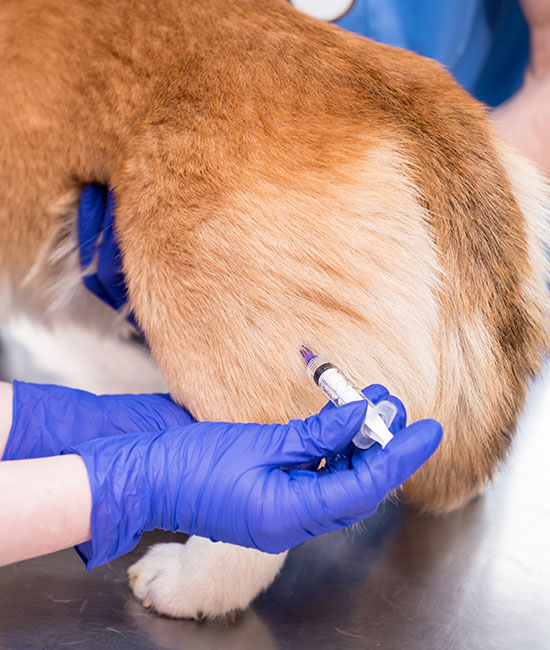
Wellness & Prevention
Better care for the best pets.


Wellness Exams

“Longer lives and healthier pets” starts with a wellness exam. A wellness exam is a yearly check-up
for your companion where the veterinarian will do a nose-to-tail exam, checking eyes and ears, mouth, skin and lymph nodes, heart, lungs, body temperature and weight. Regular exams help to improve the length and quality of your pet's life. Your veterinarian can recommend and customize a program based on your pet's breed, age, lifestyle and overall health. Paired with some diagnostic testing, a wellness exam gives your veterinarian a clear picture of your pet’s health and allows the detection of disease in early stages. Establishing your pet with a veterinary clinic also allows for timely appointments, upcoming visit reminders, easy medication refills, and will help us expedite your needs during an emergency visit.
+-
Vaccines

Initially your puppy or kitten is given a transfer of particles called antibodies from mom which allow your pet
to fight infection. These antibodies are given to the puppy or kitten from their mother while in the womb and through the milk while nursing. But by 6-8 weeks the pet's level of these helpful antibodies are decreasing, meaning they are now becoming weaker in their ability to fight various infections, so they need some help. Help comes in the form of vaccines which stimulate the immune system to produce more antibodies. Most vaccines require multiple administrations to reach full immunity, this is demonstrated in our vaccine protocol. After the puppy or kitten vaccine series is complete, your pet will need to return once a year, that is as long as you keep them current on their vaccinations to ensure their immune system remains in optimal condition to fight disease as efficiently as possible. You will receive helpful yearly reminders in the mail to help you stay on track.
Canine
Feline
+-
Canine
- Rabies (this vaccine is required by law)
- DHPP (Distemper, Hepatitis, Parvovirus, Parainfluenza)
- Leptospirosis
- Lyme disease: This Zoetis product is backed by the manufacture with warranty.
- Bordetella (kennel cough)
- Canine Influenza
- Rabies (this vaccine is required by law)
- FVRCP (Feline Viral Rhinotracheitis, Calicivirus, Panleukopenia)
- Leukemia
Parasite Prevention

Ticks and fleas are the most common ectoparasites in pet care, but they aren’t alone. There are various internal
and external parasites that our furry friends are exposed to. Although they may seem harmless to us, they can cause varying diseases. Numerous types of internal worms, skin mites, and protozoa can threaten overall health and wellness. The answer? Prevention! A monthly preventative schedule can treat and control parasite exposure and decreasing their chances of spreading disease. In some severe cases these parasites can inadvertently cause disease in humans via our pets.
The most common parasites that impact pet health include:
Does my pet really need preventatives year-round? Yes! Parasites don’t take any time off. In fact, they’re present year-round. In New York, fleas and ticks can survive the winter and enjoy an uninterrupted life cycle, generally seeking a warm host to thrive on. Similarly, worms found in feces, raw meat, and our environment are continually active.
+-
The most common parasites that impact pet health include:
- External: Heartworms. ticks, fleas, ear mites, mange mites.
- Intestinal Parasites: Hookworms, Roundworms, Tapeworms, Whipworms, Coccidia, Giardia, Toxoplasmosis.
Preventative Screening Test

Screening for the presence of heartworms and parasites in your pet is vital to their survival. Along with regular
heartworm medication, we offer multiple screening tests for both cats and dogs.
4Dx snap test: The 4Dx snap test in the veterinary world is a blood test that is run in the hospital and provides results in 8 minutes. The test is a screening process for six vector-borne diseases. We are checking your dog for Heartworm, Lyme, Ehrlichia canis, Ehrlichia ewingi, Anaplasma phagocytophilum and Anaplasma platys. You are probably thinking I haven’t even heard of most of these things why am I testing my dog for them? Your veterinarian is testing for them because ticks in our area are spreading them. Aside from heartworm, which is transmitted through mosquitoes, all of the above are transmitted through ticks.
Fecal analysis: Fecal exams are used to determine if your dog or cat has intestinal parasites such as hookworms or roundworms. Parasites not only make pets uncomfortable and irritable; they could lead to more serious conditions for your pet or even be transmitted to family members.
Age-based Bloodwork Panels: complete blood count (CBC), metabolic profile, and thyroid hormone testing. +-
4Dx snap test: The 4Dx snap test in the veterinary world is a blood test that is run in the hospital and provides results in 8 minutes. The test is a screening process for six vector-borne diseases. We are checking your dog for Heartworm, Lyme, Ehrlichia canis, Ehrlichia ewingi, Anaplasma phagocytophilum and Anaplasma platys. You are probably thinking I haven’t even heard of most of these things why am I testing my dog for them? Your veterinarian is testing for them because ticks in our area are spreading them. Aside from heartworm, which is transmitted through mosquitoes, all of the above are transmitted through ticks.
Fecal analysis: Fecal exams are used to determine if your dog or cat has intestinal parasites such as hookworms or roundworms. Parasites not only make pets uncomfortable and irritable; they could lead to more serious conditions for your pet or even be transmitted to family members.
Age-based Bloodwork Panels: complete blood count (CBC), metabolic profile, and thyroid hormone testing. +-
Certificates

Rabies Certificates: Each rabies vaccination will come with a certificate. This should be retained for your records.
Health Certificates (for travel)
OFA Testing: The Orthopedic Foundation for Animals is the recognized certifying body to evaluate and determine if a dog will have problem hips. +-
Health Certificates (for travel)
OFA Testing: The Orthopedic Foundation for Animals is the recognized certifying body to evaluate and determine if a dog will have problem hips. +-

